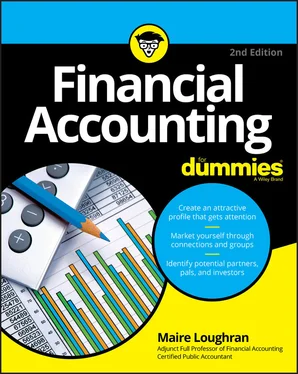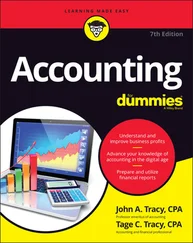Whether you work in public accounting (you have multiple clients) or private accounting (you provide accounting services only for your employer), you must be objective, meaning impartial and intellectually honest:
Being impartial means you’re neutral and unbiased in all decision-making processes. You base your opinion and reporting only on the facts, not on any preconceived notions or prejudices.
Being intellectually honest means you interpret rules and policies in a truthful and sincere manner, staying true to both their form and spirit.
If you’re objective, you keep an open mind until all facts are revealed, despite what you hear from your client’s managers, employees, or anyone else privy to the work you’re doing.
 Financial accountants must be objective, and the users of the financial statements must perceive that the accountants are objective. You never want to compromise your objectivity or else you risk creating the perception that your work — and the financial statements that result from your work — cannot be trusted.
Financial accountants must be objective, and the users of the financial statements must perceive that the accountants are objective. You never want to compromise your objectivity or else you risk creating the perception that your work — and the financial statements that result from your work — cannot be trusted.
Many types of public accounting services, such as auditing, require the financial accountant to be independent in both fact and appearance. Being independent while providing services means that you have no special relationship with or financial interest in the client that would cause you to disregard evidence and facts when evaluating your client.
What does it mean to be independent in both fact and appearance? The biggie is that you avoid any real or perceived conflicts of interest: You don’t perform services for any client with whom you have either a personal or non-audit-related business relationship. For example, if you have a significant financial interest with a major competitor of your client, your client may question whose best interests you have in mind while performing the accounting services.
Financial accountants providing tax and consulting services do not have to be independent; however, they still have to be objective.
 The concepts of independence and objectivity differ somewhat depending on whether you work in public accounting or private accounting. Public accounting is when a financial accountant, most likely a CPA, works for an accounting firm providing services such as auditing or financial statement preparation for clients. Private accounting is when you do accounting work for your own employer rather than for a client. Obviously, you can’t strive for independence when you’re doing accounting work for your own employer. So, in private accounting, objectivity is key.
The concepts of independence and objectivity differ somewhat depending on whether you work in public accounting or private accounting. Public accounting is when a financial accountant, most likely a CPA, works for an accounting firm providing services such as auditing or financial statement preparation for clients. Private accounting is when you do accounting work for your own employer rather than for a client. Obviously, you can’t strive for independence when you’re doing accounting work for your own employer. So, in private accounting, objectivity is key.
Introducing the Conceptual Framework of Financial Accounting
Every profession needs a roadmap to help the people employed in the field provide the best possible service while doing their jobs. For example, my airline pilot clients have shown me a detailed checklist they must follow each and every time they get in the cockpit, regardless of how many years of experience they have.
For financial accountants, the Financial Accounting Standards Board (FASB) started work on providing a conceptual framework — a structure of financial accounting concepts — back in the 1970s. The Financial Accounting Standards Board (FASB), which I discuss in Chapter 4, issued eight Statements of Financial Accounting Concepts through February 2018. Six of the eight were issued between 1978 to 1985. The concepts cover the financial accounting topics of objectives, qualitative characteristics, elements, and financial statement measurement.
Not sure what each of these terms means? I discuss this topic in detail in Chapter 6. For now, just remember that this financial accounting conceptual framework exists — or jump to Chapter 6right now to read all about it!
Chapter 2
Introducing the Big Three Financial Statements
IN THIS CHAPTER
 Realizing why the financial statements matter
Realizing why the financial statements matter
 Reflecting a company’s financial position: The balance sheet
Reflecting a company’s financial position: The balance sheet
 Offering a short-term scorecard: The income statement
Offering a short-term scorecard: The income statement
 Reporting cash moving in and out: The statement of cash flows
Reporting cash moving in and out: The statement of cash flows
This chapter provides a brief overview of the three key financial statements: the balance sheet, income statement, and statement of cash flows. (Later in the book, I go into much more detail about each one.) If you’re going to be an accountant, you have to get to know financial statements backward and forward. To get you moving in the right direction, I show you the purpose of each financial statement and which accounts show up on each. I also offer a thumbnail sketch of how accounts on one statement interact with accounts on another.
You find out about the three balance sheet components: assets, liabilities, and equity. I also discuss the various sections on the income statement, including the difference between revenue from operations and other gains and losses. You learn why a statement of cash flows is so crucially important to users of financial statements that are prepared using the accrual method of accounting. And finally, I introduce the three sections of the statement of cash flows — operating, investing, and financing — and explain what types of information you record in each.
You may never love financial statements so much that they become your bedtime or beachside reading material. But if you decide to pursue a career in accounting, you have to enjoy spending time with them at least a little because they’re crucial to the work you do.
Gauging the Health of a Business through Its Financials
You may have heard accounting referred to as the “language of business.” That’s because financial statements are the end result of the accounting process, and these written reports are used by many different people and entities to make their own important investment and business decisions.
 As I explain in Chapter 1, financial accounting is the process of classifying and recording all events that take place during the normal course of a company’s business. The results of these events are arranged on the correct financial statement and reported to the external users of the financial statements. External users include investors, creditors, banks, customers, and regulatory agencies such as the Internal Revenue Service (IRS) and the U.S. Securities and Exchange Commission (SEC).
As I explain in Chapter 1, financial accounting is the process of classifying and recording all events that take place during the normal course of a company’s business. The results of these events are arranged on the correct financial statement and reported to the external users of the financial statements. External users include investors, creditors, banks, customers, and regulatory agencies such as the Internal Revenue Service (IRS) and the U.S. Securities and Exchange Commission (SEC).
External users of the financial statements differ from internal users in that the external user is generally less educated than the internal user. When I say less educated, I’m not referring to this person’s formal education; an external user may very well hold a PhD from an Ivy League school! What I mean is that the external user is less educated about the company’s operations. The external user usually has no clue what is going on within the company because this person isn’t privy to the day-to-day operations.
Читать дальше

 Financial accountants must be objective, and the users of the financial statements must perceive that the accountants are objective. You never want to compromise your objectivity or else you risk creating the perception that your work — and the financial statements that result from your work — cannot be trusted.
Financial accountants must be objective, and the users of the financial statements must perceive that the accountants are objective. You never want to compromise your objectivity or else you risk creating the perception that your work — and the financial statements that result from your work — cannot be trusted. The concepts of independence and objectivity differ somewhat depending on whether you work in public accounting or private accounting. Public accounting is when a financial accountant, most likely a CPA, works for an accounting firm providing services such as auditing or financial statement preparation for clients. Private accounting is when you do accounting work for your own employer rather than for a client. Obviously, you can’t strive for independence when you’re doing accounting work for your own employer. So, in private accounting, objectivity is key.
The concepts of independence and objectivity differ somewhat depending on whether you work in public accounting or private accounting. Public accounting is when a financial accountant, most likely a CPA, works for an accounting firm providing services such as auditing or financial statement preparation for clients. Private accounting is when you do accounting work for your own employer rather than for a client. Obviously, you can’t strive for independence when you’re doing accounting work for your own employer. So, in private accounting, objectivity is key. Realizing why the financial statements matter
Realizing why the financial statements matter










